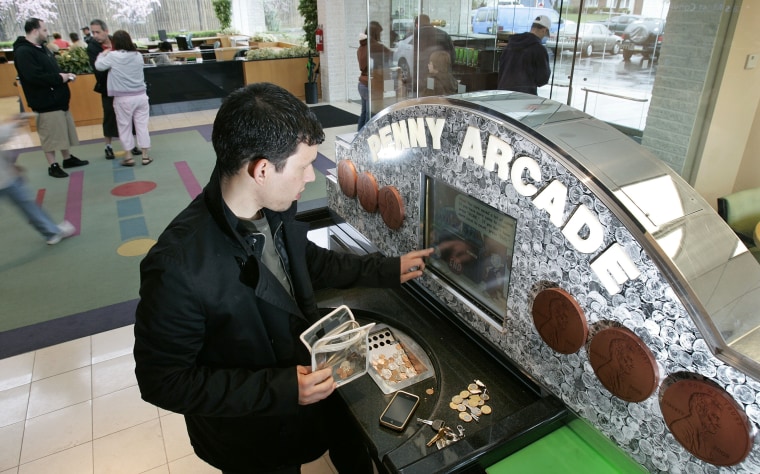Nearly all of us have spare change piling up in a jar or piggy bank, or accumulating beneath the couch cushions. But $7,000 worth?
That's how much Clark Pellington's family has collected in coins the past five years. It's a windfall from life's little transactions — change from that cup of coffee bought on the way to work, or a few dimes back from the toll booth clerk.
"I bring home every penny that lands in my pocket," said Pellington, a married 46-year-old financial services professional from Wayne, N.J.
Pellington's 9-year-old son and 5-year-old daughter split the proceeds from the family's coin stash, but don't blow it on toys or candy. Once a month, the kids round up their piggy banks and join mom and dad on a trip to a Penny Arcade machine at a local TD Bank branch.
There, they get a penny-for-penny return on their coin exchanges. The money goes into the kids' savings accounts. Each time one of the accounts hits $1,000, they move the cash into certificates of deposit that earn higher interest than savings accounts.
It's a way to feed the kids' college savings funds, and teach a lesson.
"In a few years, I'll teach them the virtues of compound interest," Pellington said. "A lot of parents sock away money for their kids. But if their kids don't learn how to manage money and save, the message doesn't get through."
It's an opportunity that many parents can take advantage of — the average U.S. household has about $90 in coins sitting idle, according to coin-counting machine operator Coinstar Inc.
Some hold onto coin stashes for years and turn them in when a rainy day arrives. But for many people, that rainy day is here, in the form of a recession.
However, if you do turn your coins in, don't necessarily expect an even exchange. Usually, it depends on how much you're willing to pay for convenience. Here are some options:
YOUR BANK: Coin exchange policies vary from bank to bank and sometimes from branch to branch. Generally, banks will give you back a full return in bills or a credit to your account if you bring in coins sorted in paper rolls. But the policy may not be so generous if you haven't sorted the coins, or aren't a customer of the bank. So you may want to call or check the bank's Web site before you load up on coins to drop off.
TD BANK'S PENNY ARCADES: If you live on the East Coast — particularly in the mid-Atlantic states — you may be near one of TD Bank's Penny Arcade machines, located inside bank branches. The machines are the legacy of TD Bank Financial Group's acquisition last year of Commerce Bancorp. Commerce introduced the machines in New Jersey and eastern Pennsylvania in 1999. Since the acquisition, TD Bank has been adding Penny Arcades to new regions, including New England.
The machines are popular because you don't have to sort coins, and there's no fee whether you're a TD Bank customer or not. It's a way for the bank to introduce its services to non-customers — especially younger ones who might become lifetime clients.
"We start to attract children at a very young age," said Linda Verba, a TD Bank executive vice president. "It's absolutely a customer acquisition strategy."
Each Penny Arcade handles an average of 1,300 coin exchange transactions per month, up 50 percent from three years ago. It's unclear whether the increasing use is linked to the recession, Verba said.
The location with TD Bank's highest coin exchange volume is in the eastern Pennsylvania city of Fairless Hills, where customers turned in $3.3 million in coins at a pair of Penny Arcades last year.
"People bring their coins in popcorn tins, glass jars — it runs the gamut," branch manager Terry Hill said. "We've had people drag pillow cases filled with coins across the parking lot."
COINSTAR: The nation's biggest coin exchanger is Bellevue, Wash.-based Coinstar, an 18-year-old company whose network of coin-counting machines in grocery stores and other retailers has grown to more than 18,400. Dump coins into the machines and you'll get back a voucher.
But you pay for Coinstar's convenience. The machines charge a processing fee of nearly nine cents on the dollar.
However, Coinstar has a new initiative offering no-fee coin exchanges — provided you're willing to redeem your money at one of more than a dozen participating national retailers. Some Coinstar machines spit out gift cards that allow you to spend coin-exchange cash at retailers including Amazon.com, Lowe's, Old Navy and Starbucks.
COINS FOR CHARITY: If you're willing to donate your coins for a good cause, you can use Coinstar and Penny Arcade machines to give to a number of charities. Look for the menu options on the machines that designate charities. Also, local fundraising drives, especially school campaigns, frequently seek out donors' spare change.
